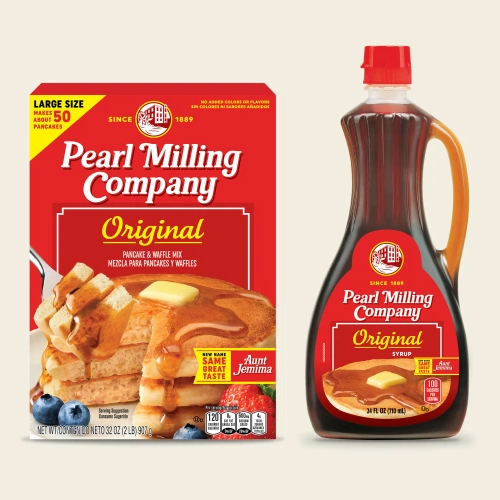
In June, Quaker Oats started looking for a new name for its more than 130-year-old Aunt Jemima breakfast brand.
It was the summer of racial reckoning, and PepsiCo—amid a social media backlash that called out Aunt Jemima’s branding as racist—publicly committed to changing the brand and removing its logo.
After examining hundreds of names, PepsiCo yesterday announced that it was rebranding Aunt Jemima as Pearl Milling Company—the name of the enterprise, founded in 1888, which originated the self-rising pancake mix that would later become known as Aunt Jemima. (Quaker Oats signed the contract to buy the Aunt Jemima brand in 1925.)
Kristin Kroepfl, chief marketing officer for Quaker Foods North America, told Fortune that the new name “reflects the dignity, the respect, and the warmth that we stand for.”
But it also appears to have been the safe choice, says Josh Gerben, an attorney specializing in trademark law: “There is no potential controversy with the name.”
That is, of course, exactly what Quaker was going for after grappling for decades with a brand that had overt ties to American slavery. Kroepfl said the company looked at several different naming categories, such as those that brought to mind expertise, a sense of place, or an occasion. Her team found that consumers responded most favorably to names linked to female personas or names that tied back to the product’s history.
But, Kroepfl says, “the ‘aunt’ path was off the table; derivations of Jemima were off the table,” which ultimately led the company to decide a female character was not the best option. “We wanted to future-proof the brand, and not create another issue,” she says. Quaker also felt that using a female persona might “signal that this brand is for women only,” undermining the intended message that “it’s an inclusive brand that is for everybody,” Kroepfl says.
Pearl Milling Company opens up the possibility of developing new products, which was challenging to do with Aunt Jemima, Kroepfl says. Having a name and image based on a racial stereotype “frankly made it difficult to invest for growth,” she explains.
What won’t change is the iconic red packaging, font, and pancake imagery. “Our intent was to maintain as much of what was working so we could also transition consumers effectively,” Kroepfl says.
The company removed the Aunt Jemima image in the fourth quarter of 2020, and the new name will hit the market in June—a year after the company made its initial announcement. Quaker plans to reference Aunt Jemima on the front of the packaging for at least six months so consumers can get used to the change.
But even after that period, Kroepfl says, the company will not abandon the Aunt Jemima brand completely. If it does, it risks another party obtaining and using the valuable trademark. To prevent that from happening, Kroepfl says PepsiCo might continue to use the name somewhere on the new packaging or have a few Aunt Jemima products in limited distribution to protect the trademark.
“We will keep the history alive, likely on the package, and for sure across other touch points,” Kroepfl says. “We want to be honest about the brand history.”
The Aunt Jemima brand has brought in $350 million in sales over the last 12 months, Kroepfl says, and its syrup and pancake mix have grown 18% and 23%, respectively. Consumers eating at home more during the pandemic have, in large part, been responsible for the surge in sales.
Quaker attempted to update the breakfast brand over the years, including removing the kerchief from the Aunt Jemima figure in 1989. But this summer the company acknowledged it had not done enough. Along with the renaming announcement in June, PepsiCo pledged a $5 million commitment to support the Black community.
This summer’s outcry against Aunt Jemima was not the first time it has come under fire. A 2015 New York Times op-ed titled “Can We Please, Finally, Get Rid of ‘Aunt Jemima’?” described the logo as an “outgrowth of Old South plantation nostalgia and romance grounded in an idea about the ‘mammy,’ a devoted and submissive servant.” In 2017, a Change.org petition launched by the husband of restaurateur B. Smith called on the company to change the Aunt Jemima branding to that of the lifestyle icon.
Not everyone is happy with the name change. Relatives of the former Aunt Jemima spokeswoman have expressed concerns that a rebranding would erase part of their family’s history. Others have argued that it tries to “scrub the legacy she represents.”
Aunt Jemima is one of a number of consumer package brands with a racist history to undergo a recent relaunch. In September, rice brand Uncle Ben’s updated its name to Ben’s Original, and in October Eskimo Pie became Edy’s Pie.
